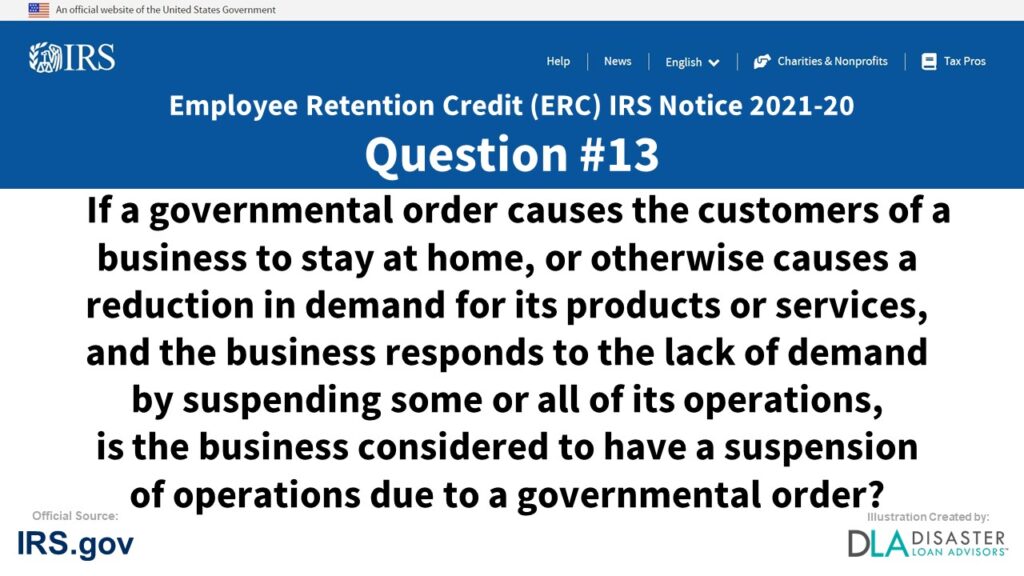
Question #13:
If a governmental order causes the customers of a business to stay at home, or otherwise causes a reduction in demand for its products or services, and the business responds to the lack of demand by suspending some or all of its operations, is the business considered to have a suspension of operations due to a governmental order?
Found under the D. Full or Partial Suspension of Trade or Business Operations section of the Employee Retention Credit (ERC) IRS Notice 2021-20 with updated guidance to help business owners follow the current ERC rules.
The answer to question #13, If a governmental order causes the customers of a business to stay at home, or otherwise causes a reduction in demand for its products or services, and the business responds to the lack of demand by suspending some or all of its operations, is the business considered to have a suspension of operations due to a governmental order?, can be found below.
ERC IRS Notice 2021-20 Question #13:
D. Full or Partial Suspension of Trade or Business Operations
If a governmental order causes the customers of a business tostay at home, or otherwise causes a reduction in demand for its products or services, and the business responds to the lack of demand by suspending some or all of its operations, is the business considered to have a suspension of operations due to a governmental order?
No. An employer that suspends some or all of its operations because its customers are subject to a government order requiring them to stay at home or otherwise causing a reduction in demand for its products or services is not considered to have a full or partial suspension of its operations due to a governmental order.
If an employer’s operations are not suspended due to a governmental order but the employer experiences a reduction in demand, the employer may be considered an eligible employer if it experiences a significant decline in gross receipts.
Example: Employer B, an automobile repair service business, is an essential business and is not required to close its locations or suspend its operations. Due to a governmental order that limits travel and requires members of the community to stay at home except for certain essential travel, such as going to the grocery store, Employer B’s business has declined significantly. Employer B suspends its operations due to the lack of demand. Employer B is not considered to have a full or partial suspension of operations due to a governmental order.
For more information about the Employee Retention Credit (ERC) IRS Notice 2021-20, visit the Internal Revenue Service (IRS) Department of the Treasury, official IRS.gov tax website.
Conclusion and Summary on If a governmental order causes the customers of a business to stay at home, or otherwise causes a reduction in demand for its products or services, and the business responds to the lack of demand by suspending some or all of its operations, is the business considered to have a suspension of operations due to a governmental order? – #13 ERC IRS Notice 2021-20
The answer to Question #13: “If a governmental order causes the customers of a business to stay at home, or otherwise causes a reduction in demand for its products or services, and the business responds to the lack of demand by suspending some or all of its operations, is the business considered to have a suspension of operations due to a governmental order?” was answered in detail above. It was found under section “D. Full or Partial Suspension of Trade or Business Operations in IRS Notice 2021-20.
Leave a comment below if you have further questions on the Employee Retention Credit (ERC) or for clarifications on If a governmental order causes the customers of a business to stay at home, or otherwise causes a reduction in demand for its products or services, and the business responds to the lack of demand by suspending some or all of its operations, is the business considered to have a suspension of operations due to a governmental order?
Employee Retention Tax Credit (ERTC): Expert Assistance to Claim Your Business ERC Credit
Up to a $26,000 ERC Refund from the IRS for Each Employee
Disaster Loan Advisors can assist your business with the complex and confusing Employee Retention Credit (ERC), Form 9413-X, and the Employee Retention Tax Credit (ERTC) program.
Depending on eligibility, business owners and companies can receive up to $26,000 per employee based on the number of W2 employees you had on the payroll in 2020 and 20213.
The ERC / ERTC Tax Credit Program is a valuable IRS tax credit you can claim. This is money you have already paid to the IRS in payroll taxes for your W2 employees.
We DO NOT charge a percentage (%) of your ERC Refund like some companies are charging. Some ERC firms out there are charging upwards of 135% to 35% of your ERC refund!
Our professional ERC fee and pricing structure is very reasonable in comparison.
If you are looking for an ERC Company that believes in providing professional ERC Services and value, in exchange for a fair, reasonable, and ethical fee for the amount of work required, Disaster Loan Advisors is a good fit for you.
Schedule Your Free Employee Retention Credit Consultation to see what amount of employee retention tax credit your company qualifies for.
Cover Image Credit: Irs.gov / IRS Notice 2021-20 / Disaster Loan Advisors.
